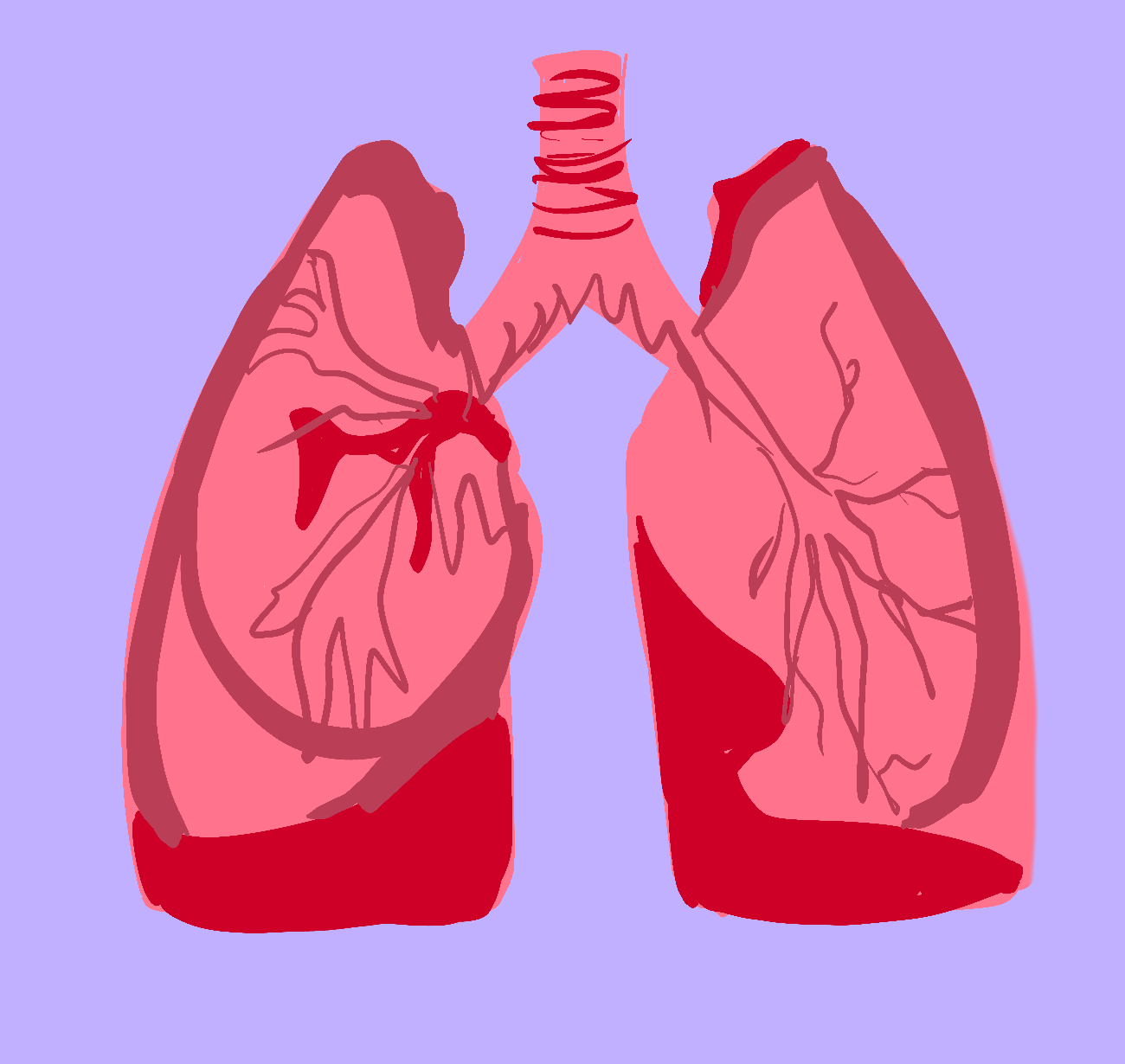YNHHS to establish long COVID treatment center
The Winchester Center for Lung Disease’s Post-COVID-19 Recovery Program is changing department and location to develop a treatment center specializing in long COVID.

Lizzie_Conklin Lungs, Staff Illustrator
The Yale New Haven Health System’s Post-COVID-19 Recovery Program — established in June 2020 — is still receiving consistent referrals for patients experiencing long COVID who are seeking specialty care.
Later this month, the program will be transferred from YNHHS’s Winchester Center for Lung Disease to their Department of Internal Medicine. The clinic will be renamed the Yale New Haven Long Haul Covid Multispecialty Clinic and will relocate from the Fitkin Memorial Pavilion to a building on the corner of Orchard St. and Frontage Rd. Associate professor Lisa Sanders — the medical director of the Post-COVID-19 recovery program — is leading the transition.
“Winchester’s extraordinary physicians and health care teams did a great job of managing these symptoms but it became clear to them, and to the other sub-specialists seeing patients with Long Haul Covid, that these patients might benefit from seeing someone who was experienced in managing this vast range of symptoms,” wrote Sanders. “It made more sense to have [patients] assessed at a single venue and to try to address their symptoms holistically. The hospital heard them out and the clinic was born.”
The clinic has received over 1000 referrals, Denyse Lutchmansingh — associate director of the Winchester Center for Lung Disease — told the News. Lutchmansingh explained that back in 2020, it was expected that patients admitted to the ICU for COVID-19 were at risk of developing long-lasting symptoms, but that the actual extent of what they were dealing with was unknown.
Assistant professor Clemente Britto-Leon — pulmonary critical care specialist for the program — explained that due to the continual flow of patients into the program and consistent need for follow-ups, the COVID-19 recovery program will be in place for the foreseeable future.
“Our program was established at the beginning of the pandemic and has now seen over 1000 new referrals, this allowed us to rapidly become familiar with the symptoms and clinical course of long-term complications of COVID-19,” Britto wrote. “We can now identify symptoms and potential complications early, generate treatment and referral pathways for other specialties, and provide well-informed counseling to our patients.”
Patients that suffer from underlying respiratory or cardiovascular disease are at greater risk of developing long COVID. However, a list of definitively associated factors with the development of long COVID has yet to be established, explained Britto.
The exact percentage of COVID patients that develop long-lasting comorbidities of the disease is unknown. Britto suggested that based on a recent study in “The Lancet,” this number is around 20 percent, with most patients going on to develop the symptoms 3 to 5 months after infection.
“The most common symptoms that our long COVID patients in the Winchester Center for Lung Disease experience are shortness of breath, fatigue, and cough,” wrote Lauren Ferrante, also a pulmonary critical care specialist for the program and assistant professor of medicine.
In addition, Ferrante explained that many patients with long COVID experience cognitive difficulty such as “brain fog,” characterized by difficulty with word-finding. Other patients, according to her, experienced “unexpected fluctuations in their heart rate.”
These patients, Ferrante noted, would then be referred to the program’s post-COVID neurology and cardiology clinic partners, respectively, based on symptoms.
The worsening of pre-existing respiratory diseases — such as asthma and chronic obstructive pulmonary disease — are some of the most frequently encountered complications associated with long COVID, described Britto. Airflow obstruction, sleep disturbances and a few cases of interstitial lung disease also occur.
Britto emphasized that a common feature seen in most of the recovery program’s patients is some degree of physical deconditioning, which makes maintaining physical fitness challenging.
The regulation of heart rate and blood pressure can also be disrupted, further exacerbating the challenge of exercise post-disease. Heart rate and blood pressure are functions of the autonomic nervous system, and these symptoms are categorized as COVID-19-associated dysautonomia, a disorder of the ANS.
“Our multidisciplinary program includes physical therapy and social work involvement, ensuring that we address not only pulmonary complications but also the often underappreciated, broader impact of COVID-19 on the livelihoods, relationships, and daily functions of our patients,” Britto wrote.
Lutchmansingh explained that while there are no data-proven treatments for long COVID, YNHHS uses a modified version of the Levine protocol, which is a reconditioning program especially helpful for patients experiencing dysautonomia.
Sanders believes that with the transition to internal medicine, the Clinic will be able to serve more patients. The Clinic will solely focus on patients experiencing long COVID, in contrast to the subspecialists at the Winchester Center for Lung Disease who saw patients that also sought care for other illnesses.
“General medicine internists are experienced in treating patients with many different kinds of symptoms,” Sanders wrote. “If subspecialty care is needed — which is not always the case — they could be seen by these subspecialists who have spent the past 2 years treating these patients.”
Britto emphasized that more clinics should be established to reduce disparities when it comes to access to this specialized care. Rachel Levine, assistant secretary for health in the Department of Health and Human Services, recently visited Yale and discussed the importance of programs such as the Clinic.
“Many individuals experiencing these complications may choose not to seek care due to being unable to afford this kind of evaluation, not having the time to travel to a specialty center or a general lack of access to care,” Britto wrote. “Increasing the number of programs would help reduce these disparities.”
For the next few months, the Clinic will be located at St. Raphael’s Hospital until its permanent relocation, according to Sanders.
YNHH Saint Raphael Campus is located at 1450 Chapel St.







